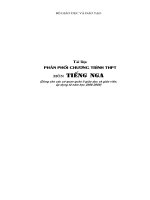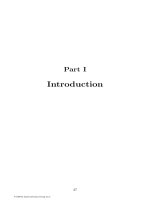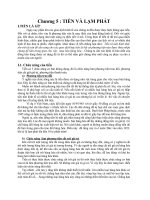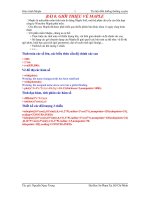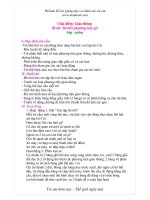Writing memos pptx pptx
Bạn đang xem bản rút gọn của tài liệu. Xem và tải ngay bản đầy đủ của tài liệu tại đây (406.76 KB, 21 trang )
WRITING MEMOS
MEMOS VS. LETTERS VS. EMAILS
MEMOS VS. LETTERS VS. EMAILS
MEMOS VS. LETTERS VS. EMAILS
MEMOS VS. LETTERS VS. EMAILS
WRITING DIRECTIVES AND
INSTRUCTIONS
• Directives tell employees WHAT to do. Instructions tell employees HOW to
do something, which may take the form of memos, letters, or even booklets.
• The goal in writing these documents is that they should be so obvious and
self-explanatory that readers will not have to ask for additional help.
SAMPLE DIRECTIVES
Please send me employee vacation schedules for the fourth quarter, October
through December, no later than January 15.
Note that we have pushed back the deadline for submitting the schedules by two
weeks. This change is made possible by the new computerized personnel system.
The new deadline should give your line workers more time to firm up their vacation
plans.
Use the attached form, which has also been simplified, for reporting fourth
quarter vacation schedules.
WRITING INSTRUCTIONS
• Instructions differ from directives in the amount of information they
provide.
• Assume that the writer knows nothing about the procedures.
HOW TO WRITE INSTRUCTIONS
When you need to explain in writing how to do something, a set of instructions is your best choice. By
enumerating the steps, you make it easy for readers to perform the process in the correct sequence. Your goal
is to provide a clear, self-sufficient explanation so that readers can perform the task independently.
Equipment Needed: Writing Materials
Preparing to Write Useful Instructions
1. Perform the task yourself, or ask experts to demonstrate it or describe it to you in detail.
2. Analyse prospective readers’ familiarity with the process so that you can write instructions at their level
of understanding.
HOW TO WRITE INSTRUCTIONS
Making Your Instructions Clear
1. Include four elements as needed: an introduction, a list of equipment and materials, a description of
the steps involved in the process, and a conclusion.
2. Explain in the opening why the process is important and how it relates to a larger purpose.
3. Divide the process into short, simple steps, presented in order of occurrences.
4. Present the steps in a numbered list or present them in paragraph format, making plentiful use of
words indicating time or sequence, such as first and then.
5. If the process involves more than ten steps, divide them into groups or stages identified with
headings.
6. Phrase each step as a command (e.g. “Do this” instead of “You should do this”); use active verbs,
specific terms (“four” instead of “several”)
HOW TO WRITE INSTRUCTIONS
7. When appropriate, indicate how readers may tell whether a step has been performed correctly
and how one step may influence another. Supply warnings when performing a step incorrectly that could
result in damage or injury, but limit the number of warnings so that readers do not underestimate their
importance.
8. Include diagrams of complicated device, and refer to them in the appropriate steps.
9. Summarize the importance of the process and the expected results in the conclusion.
Testing Your Instructions
1. Review the instructions to be sure they are clear and complete. Also judge whether you have
provided too much detail.
2. Ask someone else to read the instructions and tell you whether they make sense and are easy to
follow.
CRITERIA FOR WRITING SUCCESSFUL
MEMOS
DATE:
TO:
FROM:
SUBJECT: (focus + topic)
INTRODUCTION
A lead-in, warm-up, overview stating why you’re writing and what you’re writing about.
DISCUSSION
Detailed development, made accessible highlighting techniques, explaining exactly what you want
to say.
CONCLUSION
A summation stating what’s next, when this will occur, and why the date is important.
SUBJECT LINE:
(A “WHAT” ABOUT THE “WHAT”)
= FOCUS + TOPIC
Erroneous:
Subject: Language Teachers
Better:
Subject: Faculty Loading for Language Teachers
INTRODUCTION
• One to two introductory sentences that tell what and why you’re
writing
INTRODUCTION (EXAMPLES)
1.
In the third of our series of quality control meetings this quarter, I’d
like to get together again to determine if improvements have been made.
2.
As a follow-up to our phone conversation yesterday, I have met our
VPAA regarding your suggestions. She’d like to meet with you to discuss
the following ideas in more detail.
DISCUSSION
• Developing the content specifically
• Answers reporter’s questions
• Note that the longer the paragraph, the more likely your audience will
avoid reading.
DISCUSSION
Sample: Unfriendly Text
This year began with an increase, as we sold 4.1 million items in
September compared to 3.8 for September 2014. In October, we
continued to improve with 4.3, compared with 3.6 for the same time in
2014. November was not quite as good, as we sold 4.0 against the
November 2014 figure of 4.2. December was about the same with 4.2,
compared to 4.1 for December 2015.
DISCUSSION
Sample: Reader friendly text
2014
2015
Increase
September
4.1
3.8
October
4.3
3.6
November
4.0
4.2
December
4.2
4.1
Decrease
0.3+
0.7+
0.20.1+
CONCLUSION
- This should be able to sum important points of the body and provide
closure.
SEATWORK 8 (INDIVIDUAL TASK)
An employee under your supervision sees a problem in his or her
work environment and has written a memo suggesting a solution. You
don’t believe the suggested solution will work. Write a memo providing
a response.
